The Glendale Unified School District has been in the news over the last several months because parents there are fighting back against a hypersexualized curriculum implemented with little-to-no parental input. In Glendale, located in a section of Los Angeles County with a large Armenian population, parents are heavily involved in their kids' education, and not just the sex-ed component, so it's not the right place to try to pull one over on unsuspecting parents.
It looks like school and district administrators tried to do just that, though. Over the last year, they've rolled out courses sponsored by Verizon Innovative Learning that haven't gone through the formal approval process and that use unapproved materials and "free" tech gadgets with complimentary data plans (but no assurances on what happens to that data), and badgered parents to sign creepy and invasive "release" forms that essentially turn middle school students into an unpaid marketing department for the tech giant. And the best part? Students at the school thought they were signing up for Intro to Coding and Robotics for the 2022-23 school year but instead were force-fed Verizon's Immersive Media and Digital Product Innovation courses with no option to actually learn coding and robotics. At least one student's official transcript still reflects that she took "Intro to Coding and Robotics" instead of the Verizon courses - because they still haven't been formally approved by the district.
Of course, the tech lab at the school and all of the coursework, provided through what they're labelling as a grant, are emblazoned with the Verizon logo and branding.
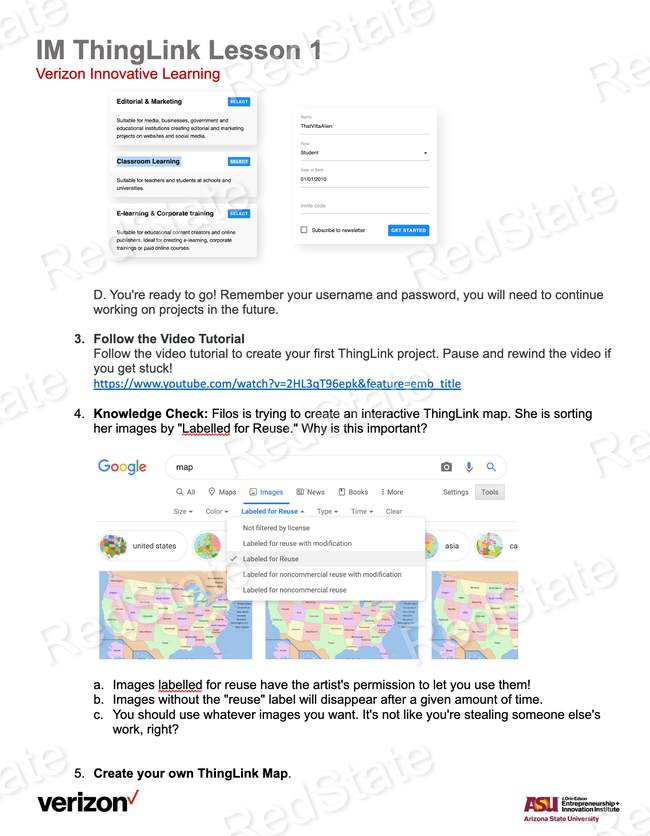
What a great way to get kids trained and hooked on your apps, obtain free photos and videos of the students for use in advertising your products, and gather data to keep those new customers loyal to Verizon for life (and likely for other purposes, too). And this is happening at hundreds of schools all across the country, under the guise of philanthropy.
Intro to Coding and Robotics, or Immersive Media?
When a Glendale USD parent we'll call Ms. A (we're not sharing her full name for privacy reasons) went to her daughter's Back to School Night in August 2022, she was concerned that the teacher gave a presentation on an Immersive Media course and not the course that was listed on her child's schedule, Intro to Coding and Robotics. She asked for a syllabus that night but it wasn't available. After being unable to find any information about the course on either the school's or the district's website, she emailed the teacher to again request the class description and weekly curriculum.

He replied with an outline, which is also found here. Lesson 5, "Sustainable Spaceship" immediately stood out as having a suspect narrative, but overall there's nothing inherently wrong about the things the students would be learning to do. However, if a student wants to actually learn how to code or build a robot, not much in this class is going to assist in that endeavor. It seems more geared at creating customers for Verizon's gadgets and promoting particular agendas.
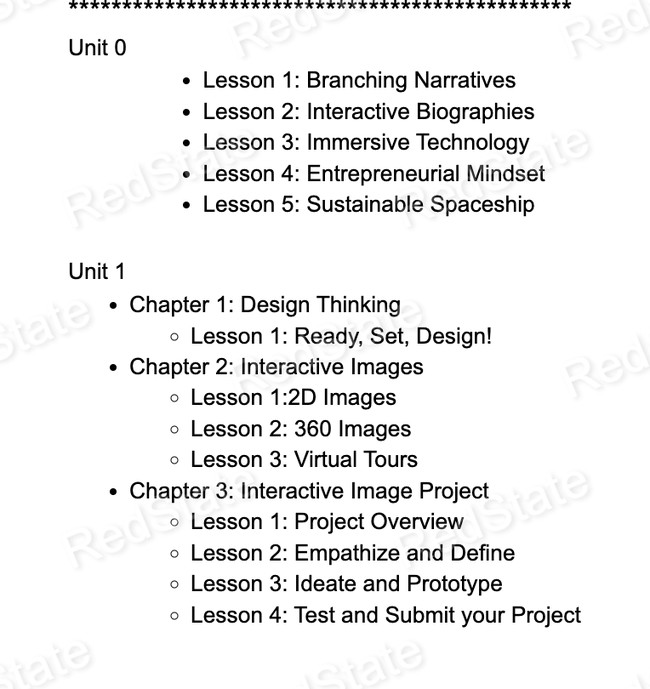
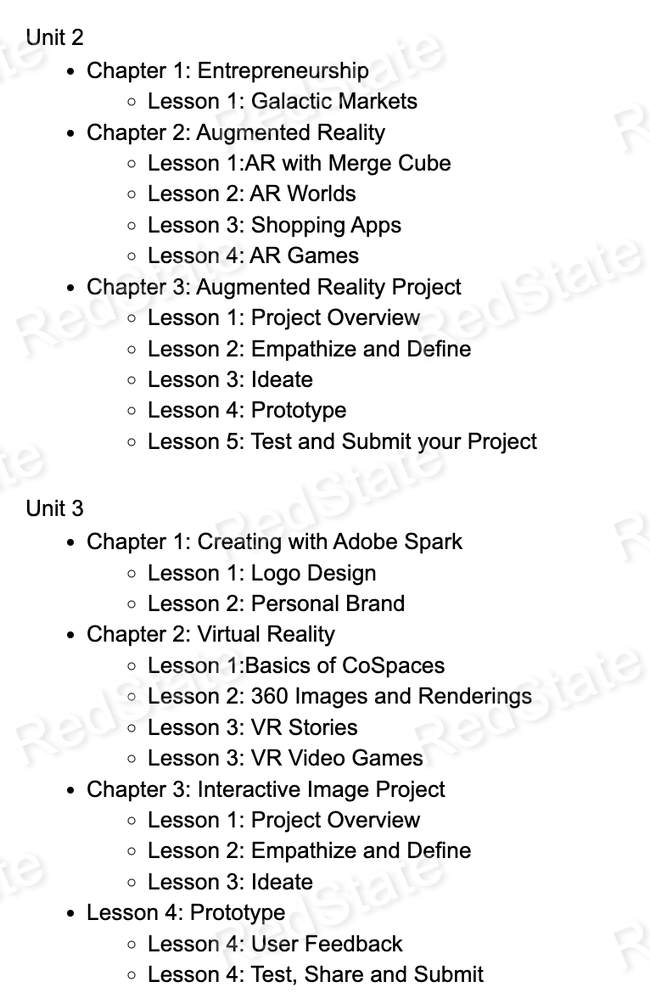
Verizon Innovative Learning Partnership
Just what are these Verizon courses? According to Verizon's website:
Launched in 2021, Verizon Innovative Learning HQ, a free education portal that makes innovative learning tools available to all K-12 educators nationwide, is unveiling more immersive educational content, including new esports and gaming-based curricula, as well as building on existing lesson plans and apps to provide students with the skills needed to thrive in a digital world.
Immersive courses aren't limited to tech subjects, though.
- Kinfolk: The Black Radical Imagination "Overall, this course is a primer for the Kinfolk app, which explores the intersections between art, history, and social justice through diverse perspectives."
- Climate Justice: Africa and Its Diaspora "The Museum of Contemporary African Diasporan Arts (MoCADA), in partnership with Verizon and Arcadia Earth, invites students to explore a 7-part educational journey centered on climate justice through the lens of residents across Africa and its diaspora."
Verizon partners with nonprofit (and lefty) organizations like Digital Promise, universities like Arizona State University, and companies like textbook provider McGraw Hill to develop the curriculum utilized in the Verizon Innovative Learning Partnership (VIL). Participating school districts execute agreements with Verizon in which they commit to providing at least one VIL elective course throughout the term, enroll a certain percentage of the student body in the elective, secure releases from the parents and students, and more, in exchange for Verizon building a "state of the art" tech space at the school (complete with Verizon branding) and complete curriculum and supplies, including tech equipment, for the teacher(s) and students.
This point will become important later, so it bears emphasis: The courses being taught at GUSD are developed by Arizona State University and are designed to comply with various content standards. They're turnkey courses in which all of the lesson plans and activities are already developed and planned out.
Bait-and-Switch
Ms. A then asked the superintendent about the discrepancy between the course as it was listed on the student schedule and what was actually being taught, and on September 1, 2022, was told that "the teachers are in the process of writing the course outline for this new course to submit it for approval in the coming weeks. It is a very new program developed in conjunction with the Verizon Learning grant. In the meantime, they are using a related course code which is what appeared on the schedules."
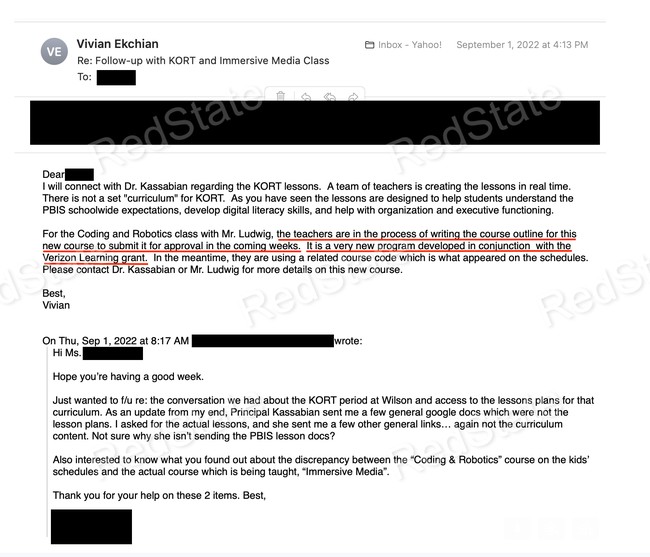
Fast forward to July 2023. When Ms. A reviewed her child's official transcript, the yearlong class "Intro to Coding & Robotics" still appeared, but she knew that's not what her child was taught. According to emails reviewed by RedState, on July 30 she emailed Dr. Narek Kassabian, the school principal, and said (in part):
I'm reaching out about a discrepancy on [child's] report card records. As I mentioned in the beginning of last school year to Mr. Ludwig and Ms. Ekchian...the elective that [student] was enrolled in was supposed to be "Intro to Coding", but instead, the class that was taught all year long was "Immersive Media <semester 1>" and "Digital Product Innovation <semester 2>" - both courses derived from Verizon-created courses.
At the time I brought this up, Ms. Ekchian told me the "Intro to Coding" class was merely a placeholder, since the actual classes being taught were not yet part of the approved curriculum but was in the process of being approved in the ‘coming weeks’. That was back in Sept 2022 (almost a full year ago).
Dr. Kassabian replied on August 4 that she was just waiting for updated course codes and then the child's official transcript would be updated. Ms. A pushed for more information since a year seemed like a long time for course approval, and over a few email exchanges she eventually asked some very pointed questions of the principal and a district official:
- When were the courses reviewed by the district the first time? Since you mentioned a ‘final review’ will be in October, where can I find documentation on the prior reviews for the courses and who signed off on those prior reviews?
- Are there other courses being taught at Wilson Middle school which have not been approved by the board?
- Is Intro to Coding even being taught anymore to students? I see it’s still on the class catalog / student agendas for this year - so are students who currently have Intro to Coding on their schedules for the 2023-2024 school year actually being taught the coding class or will they be taught the Verizon Immersive Media class?
GUSD's Executive Director of Secondary Education, Dr. Chris Coulter, first told Ms. A that the staff at the middle school had done their part to get the course approved but the district somehow dropped the ball and he was going to look into it to make sure it didn't happen again. He also goes through a long explanation of all of the paperwork needed for a course to be approved, as if this was a course being created from scratch.
However, Ms. A learned that students were still being enrolled in Intro to Coding and Robotics for this school year, and the VIL Immersive Media and Digital Product Innovation courses were not listed. So on August 18, 2023, she asked Dr. Coulter even more pointed questions about why the other parents in her child's class were never notified about the bait-and-switch, and how the principal is allowed to enroll students in a course that hasn't been formally approved, and how, given the board-approved partnership with Verizon, the district hadn't completed the process of approving the courses and informing parents.
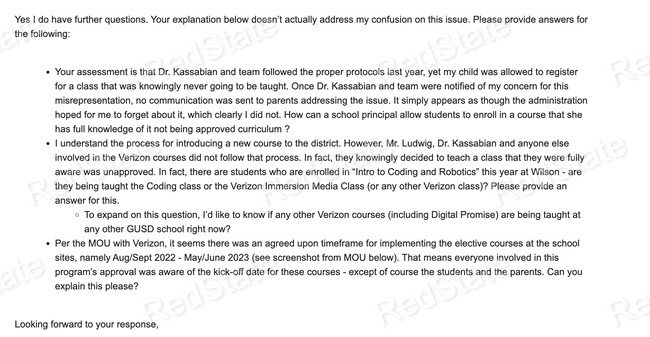
Knowing that VIL supplies the full curriculum, Coulter's reply is difficult to believe.
The process of writing and approving these outlines takes a lot of time, so there have been some rare occasions where we offer the course while the approval process proceeds. For example, there is an elective PE course at Toll that has taken much longer than expected to get through the process. It is very popular with students and there is nothing remotely controversial in the content, so the class is running while we work through the approvals in the next couple months. This was also the case with these Verizon courses as we knew there was significant student interest and none of the content in the courses is controversial in any way.
These courses should have been approved last year, but they were not....Dr. Kassabian and her team did the best they could to fasttrack the writing of the course outlines and submitting them to the district. The ball was dropped at the district office and we fully admit that and offer our apologies.
Why does the writing of the course outlines need to be fast-tracked? The outlines are right there on Verizon's website, and teachers are able to log in to obtain all of the rest of the information, including the content standards the course meets. Undoubtedly there are some GUSD or California-specific portions of the course approval, but given what Verizon is already providing it shouldn't take more than a year - and lots of not-quite-truthful statements from school and district staff - to get it approved.
Note that Coulter felt it necessary to say that the content isn't controversial. That's not up to him to decide. If it wasn't controversial, why hasn't it been approved yet?
In addition, what recourse do the students have who actually want to learn coding and robotics?
As of September 6, 2023, Ms. A's child's official transcript still reflected the Intro to Coding and Robotics course, not the Verizon courses.
Creepy Release Forms
Ms. A shared emails from her child's teacher showing numerous reminders to have the release forms (one from Verizon and one from ASU) signed and returned, and one contained a bit of a guilt trip.
Verizon Innovative Learning has given Wilson many 21st century tools for our student body. As part of our agreement, we need to show Verizon that students are using those tools. The way we do that is by photographing students using those tools and regularly reporting back to them. Occasionally, a photographer will come out to take pictures for ASU or Verizon to demonstrate student learning and, perhaps, use photos in promotional materials.
I, Hans Ludwig, would be ever so grateful if you allow us to photograph your child.
The Verizon release is quite a bit more broad than that. The release in the email from Mr. Ludwig already contained the yellow highlighted part; I've underlined certain portions in red for emphasis.
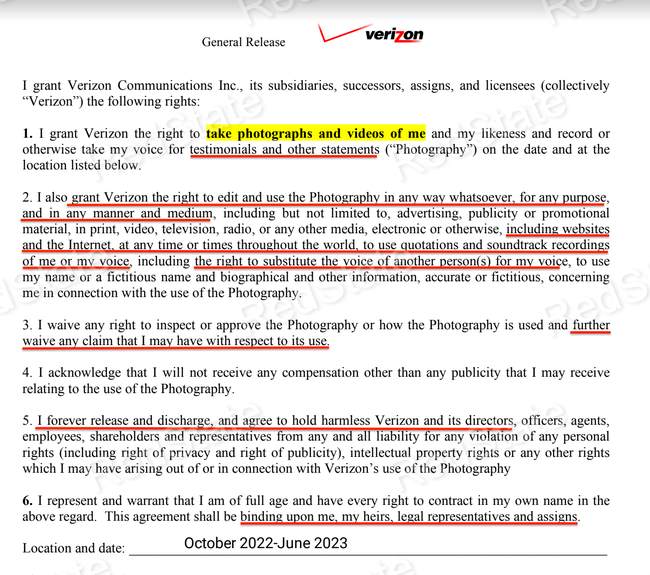
So you're allowing Verizon to take photos and videos and record your child's voice then edit and use it in any way whatsoever, at any time, anywhere, and until the end of time, without you or your child inspecting the final product. Oh, and they get all of that for free.
The ASU release is slightly different but just as problematic.
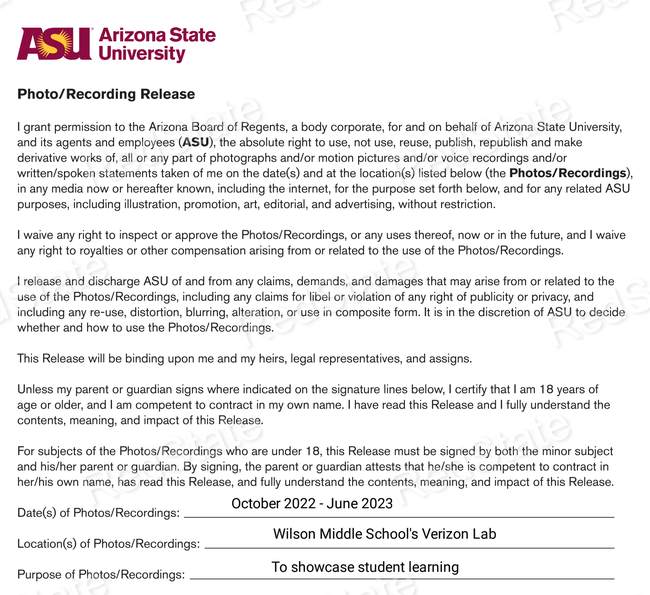 Given how broad and overbearing these releases are, it raises concerns about ownership of any intellectual property created by a student during one of these classes. Will ASU and Verizon claim joint ownership?
Given how broad and overbearing these releases are, it raises concerns about ownership of any intellectual property created by a student during one of these classes. Will ASU and Verizon claim joint ownership?
In the Memorandum of Understanding between the district and Verizon Innovative Learning Program, we learn that GUSD agreed way back in March 2021 to implement these courses and enroll at least 30 percent of the school student population each year, to have 100 percent of the student population utilize the technology and the Lab, and to commit to deploying Verizon 5G to the Lab.
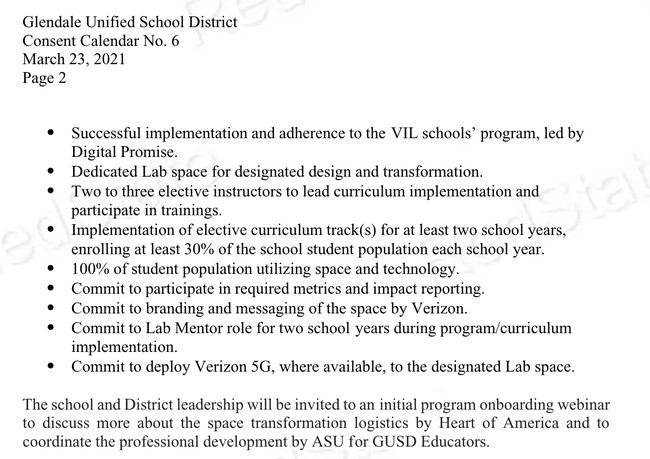
They also commit to having the Lab Mentor "submit monthly Digital Media artifacts" to VIL. What does VIL do with those Digital Media artifacts? How are they stored and for how long? Who can access them? But, if GUSD doesn't fulfill that or any other requirement, the at-will agreement can be terminated. What happens to the Chromebooks and other tech gadgets then? Moreover, what happens after the two-year agreement is complete? In my reading of the MOU, none of those questions are answered.
Philanthropy and corporate giving are one thing; brand placement, acquiring photos and videos of students to use in advertisements and not compensating them for such, and the not-so-covert collection of student data (including data gleaned/collected when the students have the devices at home), is an entirely different thing. For the Glendale Unified School District to trick students into taking these courses is unconscionable.
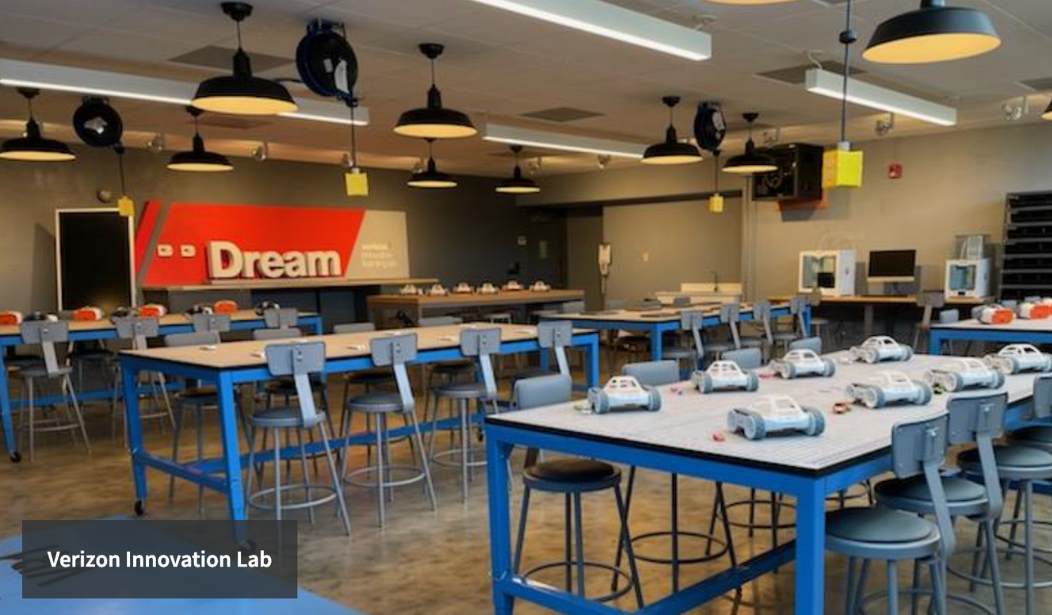








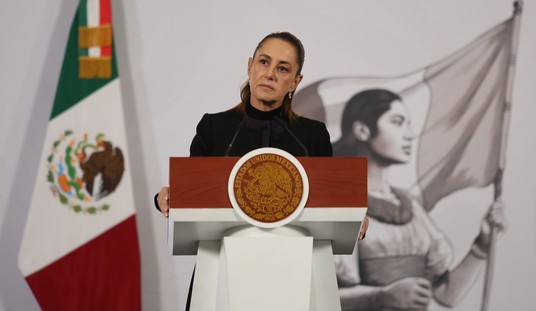





Join the conversation as a VIP Member